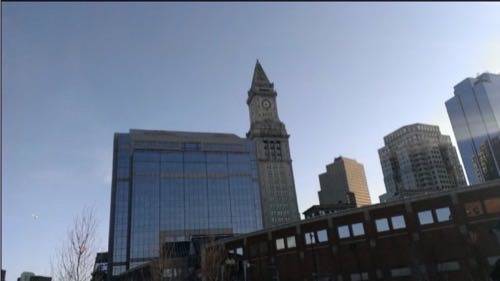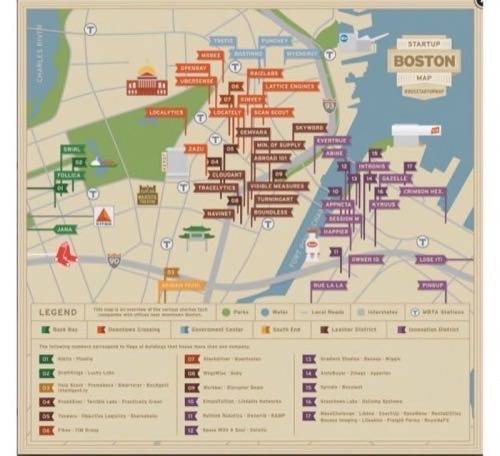
When you are home to some of the brightest people in the world, a huge and growing tech community, some of the biggest companies in the country and a litany of top tier global universities, you should not have to defend yourself against hopeless hacks and biting satire. Yet Boston has to do just that on a near-daily basis.
Before Silicon Valley became Silicon Valley, before New York invented its erstwhile Silicon Alley, before Austin became the epicenter of the annual March madness homage to geeky sex, Boston was innovating and driving technological and economic advancement in the United States.
You know what has changed about that? Not a damn thing.
Playing The Role Of Big City
Yet Boston’s got a chip on its shoulder. To me and its other residents, it is the Rodney Dangerfield of American metropolises – it ain’t get no respect. In the last few days alone, the Hub of the Universe has been the target of several scurrilous – if somewhat amusing – attacks in the media. It started with The Onion and continued on Gawker and The Atlantic Wire.
It seems the rest of the country looks upon Boston like it is some neurotic little hamlet of little consequence, full of its own importance and whining to be heard at the big boy table of, you know, actual cities. That is the gist of The Onion piece, titled Pretty Cute Watching Boston Residents Play Daily Game Of ‘Big City:’
Inhabitants of real cities across the nation smiled in affectionate amusement as Bostonians put on their big-city clothes, swiped their Charlie cards for a ride on one of the MBTA’s trolley-like subway cars—charmingly called the “T”—and rushed downtown for “important” business meetings at the John Hancock Building, the South Boston Innovation District, and other pretend centers of global industry and commerce.
They’re getting it all wrong.
The Real Boston Story
You know where the technology was developed for that cool little lady, Siri, that you talk to on your iPhone every day? At Nuance, just outside of Boston. How about the pipes that keep the Internet going smooth and fast? At Akamai, in the heart of Cambridge. What is one of the first companies to create computer memory boards and later the cloud, that invention that has everybody all abuzz these days? EMC, headquartered right outside Boston. How about technology for content marketing, a space everybody is trying to figure out these days? Yeah, HubSpot was there first, years ahead of the curve.
If you totaled the revenue of all the companies that started at MIT or by graduates, it would be the 11th largest economy in the world.
Boston has one of the highest concentration of startups and entrepreneurs anywhere outside of SoMa in San Francisco. It has startup accelerators like TechStars, an army of companies making robotics, one of the leading regions of mobile developers and thought leaders and some of the most progressive Big Data companies around. Oh, and bio-tech, the industry that dwarfs them all. If you ever get sick, be thankful that there is probably somebody in Boston creating technology to keep you alive.
OK, Onion, I’ll Bite
So let’s take a look at The Onion’s charges, and see what really sticks – especially in comparison to the rest of the country:
- We are neurotic. But not as neurotic as D.C.
- We are full of our own righteous self-importance. But not as full of ourselves as San Francisco.
- We scurry like rats to our so-called important meetings that are not that important. Just like our cousins, the Mice of Manhattan.
- We are overtly proud of our funny accents. Just like those unintelligible hacks in Chicago.
At least we have an Innovation District. Two really, when you count Kendall Square on the edge of MIT’s empire. How’s your innovation district doing, Columbus, Ohio? Chicago? Los Angeles, San Diego, D.C., Atlanta? Yeah, that list could go on for a while.

What do people have against Boston? Part of the problem is that we insist on inserting ourselves into the national conversation. How dare we? How does a small city like Boston have any right to exert any influence at all?
What Boston Is Really About
Boston proper has about 625,000 people. The Greater Boston metro area actually has 4.5 million people, the 10th largest in the country. If we extend that to the commuting region around Boston, we’ve got 7.6 million people, the fifth largest of its distinction in the U.S.
We have the highest density of higher education in the known world. Within a mile or so of my apartment on the Somerville/Cambridge line I can get to Harvard, MIT and Tufts. Extend that to two to three miles and we can add Emerson, Northeastern, Boston University and Suffolk University. If you ever run into a lawyer trained at Suffolk, watch out. Those sharks are ruthless. A couple extra miles more and we find Boston College, which, as residents love to point out, is actually nowhere near Boston proper.
You know what all those people and all those universities get us?
You guessed it: money, power, influence. It also creates a certain smugness, a holier-than-though persona and that heavy chip on our shoulders. Why should New York and San Francisco get all the headlines when we have a city and region with a highly distinct culture, thousands of emerging companies, a high concentration of startups and venture capitalists and some of the best damn movie makers on the planet?
If anything, the Boston tech scene is guilty of letting the blowhards in New York and San Francisco run roughshod over us.
Then There Is Gawker
But The Onion wasn’t alone. In response, Gawker hack Hamilton Nolan (who has a penchant for beating on Boston) decided to write his own, definitely not satirical, takedown of the city:
“Boston,” a cramped Hollywood crime movie set populated primarily by the lesser Wahlbergs, is engaged in a gleeful back-and-forth exchange of japes with a national media outlet, calling to mind the beaming smile of a developmentally disabled child who has just been allowed to win a game of tag with a grown man.
Nolan reaches for every stereotype he can find. We are apparently all drunks in Boston. We make a lot of Irish gangster movies. Our infrastructure is extremely old and the “T” (our subway system) is a joke. “Get it straight, Boston: we don’t kid because we love. We kid because Boston sucks,” Nolan writes.
Sometimes, it is good to be hated. The Onion, Gawker and the rest actually did Boston a favor. All this attention just reinforces the fact that despite their snarky cynicism, Boston really does matter.

















